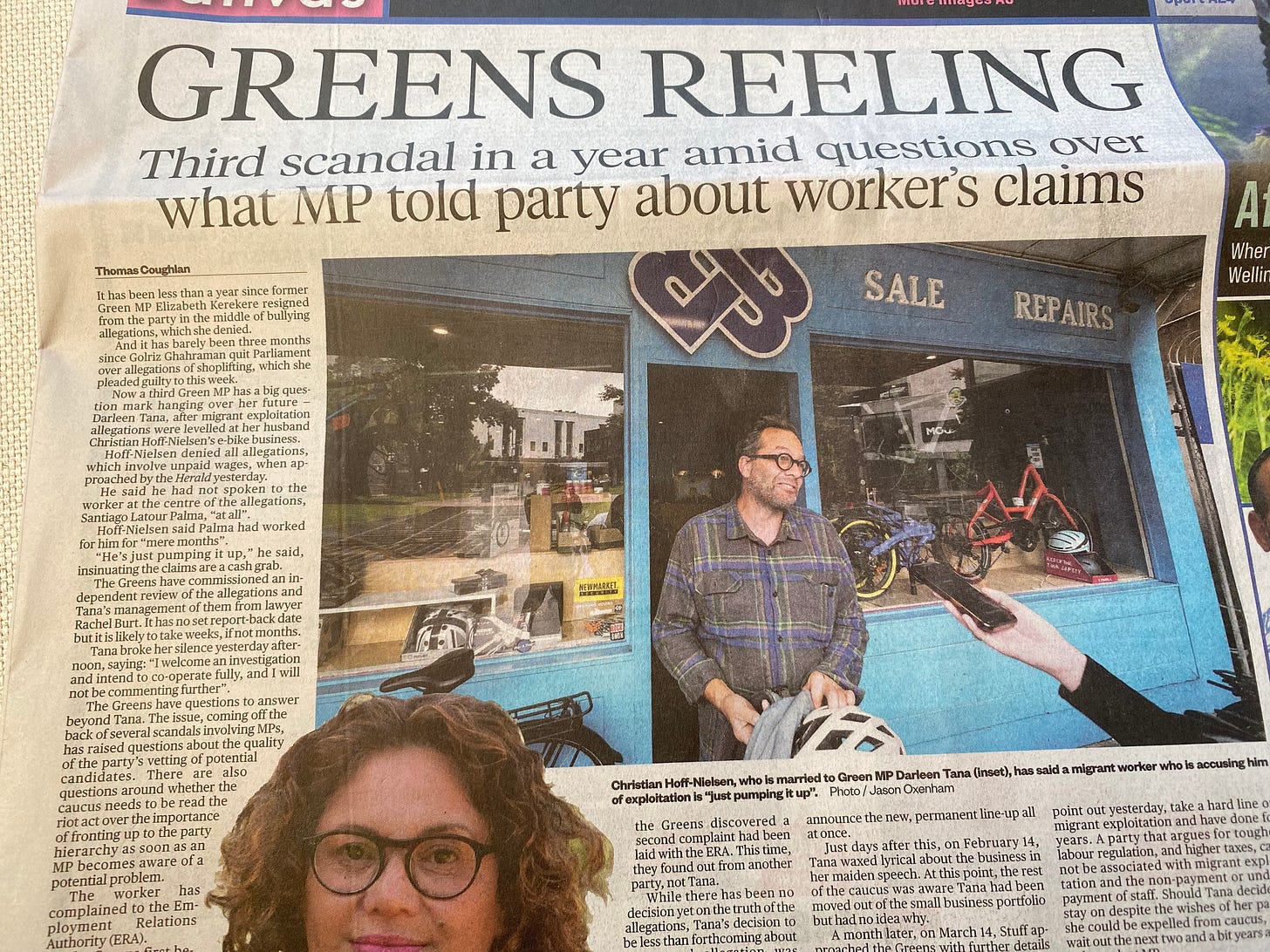Once again, a Green Party MP has made headlines for the wrong reasons. If you’re not up with the allegations about exploitation of migrant workers at the e-bike company of the husband of MP Darleen Tana, the best summary is on Stuff.
Given also the troubles around former MPs Elizabeth Kerekere last year and Golriz Ghahraman early this year, can the Greens regroup? Yes they can. But there are some lessons.
Polls so far show the Greens are still around what they got in the last election, which was their best result ever – 11.6 percent. Their polling has held up in the new year, despite the Ghahraman affair and the (possibly unjustified) accusations that they’d handled the matter poorly in PR terms.
Again, though, there are questions around why it took a good six weeks for the Tana story to be revealed and why the Greens haven’t taken prompt and decisive action. That may come from an abundance of caution over natural justice and fully investigating before acting. Or were they just having trouble extracting the truth? To give them a break, the Greens were also dealing with a change of co-leader and the tragic death of the much-loved Efeso Collins – so, wouldn’t you have wanted to put the whole thing off for a while?
In the court of public opinion, though, there are few excuses: MPs are held to a high standard of personal conduct, and the Green Party did promise to lead by example. And the media hounds are always sniffing for blood.
Exploitation of migrant workers is the exact opposite of all that the Greens stand for. (The last case of such exploitation by a sitting MP that I recall involved the late Taito Phillip Field, although that was complicated by corruption charges.) It’s presently unclear as to what will become of Darleen Tana. Surely she can’t carry on as a Green MP, but will she remain as an independent or vacate her seat?
What went wrong anyway? Somewhere in the party machine during the selection process, a background check wasn’t thorough enough, or confirmation bias caused people to discount awkward facts. The Greens aren’t the only party to have had problems in candidate selection, of course, but it looks like they need to review their processes.
These events damage the party’s reputation, but the Greens have a strong brand and a loyal base – and the election is still a long way away.
They can recover from a bad start in 2024, which has over-shadowed the election of co-leader Chloe Swarbrick. From now on, though, they need to get the basics right.
This is the kind of Weekend Herald headline that no party wants to see displayed on stands in supermarkets and shops on a Saturday morning:
The Labour Party meanwhile have been soul-searching over how best to tax the wealthy. It’s a valid question. After all, the system is unfair, as David Parker revealed last year. But Labour has been languishing in the polls lately, going below their election result at times.
The recent media analysis of Labour makes them sound like the party of taxation and little else. But, just like creating a new bureaucracy (which Labour’s good at), creating a new tax isn’t in itself a solution to any social problem – other than resentment. Taxation is necessary but not sufficient for achieving public policy goals. So the Labour Party should clarify what it aspires to achieve, and then discuss the taxation reforms required to get there. Don’t put the cart before the horse.
The equation “Labour=Tax” is readily used against Labour by their political opponents.
Political debate should be less about “who can we tax?” than about “how do we build a better society?” – so don’t make people think that your main policy proposition is a new wealth tax.
Chris Hipkins did at least mention the Future of Work project that they initiated back in 2016. So, what became of that? A tripartite forum involving the NZCTU and Business NZ continued while Labour was in office, and the documents are on the MBIE website. But, before you click on that link, I warn you that it’s not inspiring stuff.
“We’ll take care of that for you, minister,” the officials said. And it died a natural death in a tower in Wellington.
As we’re on the verge of an AI-driven global transformation, it’s time to think even more seriously about the future of work in all its forms. That’s a topic I should delve into more – perhaps soon.
On TVNZ’s Q+A, Labour’s former finance minister Grant Robertson did at least make some comments about AI and the importance of “soft skills” for the future. As he’s going to be VC at Otago University, he also talked about better collaboration between the universities – a tired old cliché. I’m sure he’ll be competing with the best of them once he gets his feet under his new desk in Dunedin. After all, he’s a politician.






Whatever happened to innocent until proven guilty? How about we wait until the case about alleged immigrant exploitation has been heard before we move to the next step re Green MP, Darlene Tana? We’re too quick to conduct these matters via the media with speculation and rumour given the gloss of evidence and the accused hung, drawn and quartered without the considered, balanced and due process being allowed to examine the actual evidence and determine the facts. It’s extremely difficult to wash off the stench of public opinion and an exoneration never makes the same impact in the media etc as the original salacious speculation. Fairs fair and good on the Green Party for using a natural justice and evidence-based approach to these matters.
Labour talking about the well-recognised adverse effects of increasing wealth inequality would provide a sound context for policy actions such as tax on wealth and/or capital gains, as well as other programmes such as universal basic services.